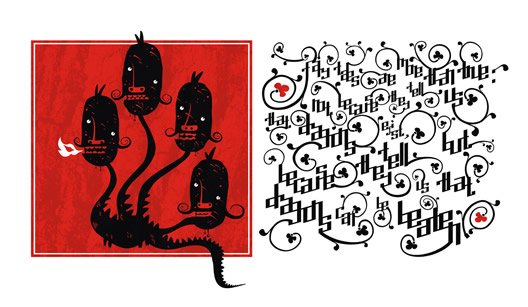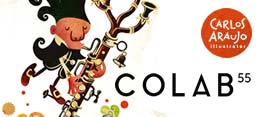Spotlight: Outubro/October

A Ética dos Contos de Fada
The Ethics Of Elfland
A ilustração acima, "The Ethics Of Elfland" (A Ética no País das Fadas), é o destaque desse mês. Inspirada em uma frase de G. K. Chesterton: "Fairy tales are more than real: Not because they tell us dragons exist but because they tell us that dragons can be beaten." e também nos bestiários, bastante populares durante a Idade Média. A idéia era criar um design que lembrasse esses bestiários antigos.
This month's illustration, called "The Ethics Of Elfland", was inspired by a quote by G. K. Chesterton: "Fairy tales are more than real: Not because they tell us dragons exist but because they tell us that dragons can be beaten." and by the bestiaries, a kind of illustrated book very popular during the Middle Ages. The goal was to create a design that would evoke those illuminated pages.
Os bestiários apresentavam a descrição física de animais (reais e imaginários) acompanhados de algum tipo de lição de moral. Cada animal estava associado à algum vício ou virtude, cada ser vivo possuia um simbolismo especial carregado de significado teológico.
An bestiary showed a description of the apearance of an animal (that could be a real or imaginary beast) accompanied with a moral lesson. Each animal was associated with a virtue or vice, with a symbolism heavily influenced by christianity.
O nome usado para essa ilustração é na verdade o título de um dos capítulos do livro "Ortodoxia" escrito por G. K. Chesterton. Ele foi um escritor inglês cujo livro mais conhecido é, provavelmente, "O Homem Que Era Quinta-feira". Segundo George Bernard Shaw: "O mundo não é agredecido o suficiente por ter tido Chesterton".
The name of the illustration is also the title of one of the chapters of the book "Orthodoxy" by G. K Chesterton. He was an english writer and his most famous book is perhaps, "The Man Who Was Thursday". George Bernard Shaw said this about him: "The world is not thankful enough for Chesterton". Tweet

 Carlos Araujo é ilustrador e vive com a mulher e a filha num apartamento tão grande que (às vezes) os três se perdem lá dentro.
Carlos Araujo é ilustrador e vive com a mulher e a filha num apartamento tão grande que (às vezes) os três se perdem lá dentro.














0 Comentários:
Postar um comentário